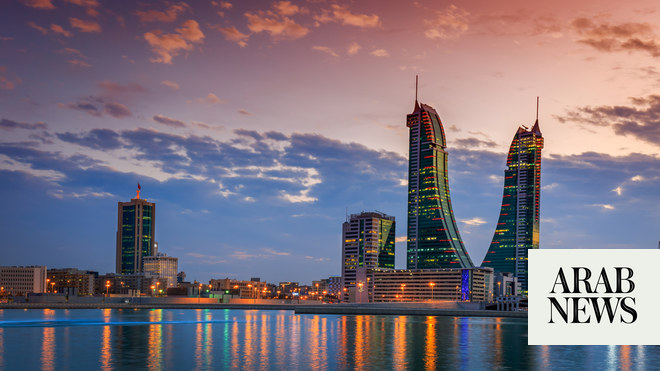
RIYADH: Bahrain posted a real gross domestic product growth rate of 4.9 percent in 2022, the highest economic growth pace since 2013, its Ministry of Finance and National Economy announced in its annual economic report.
The report also highlighted that Bahrain is steadily progressing in its economic diversification journey, as its non-oil real GDP witnessed 6.2 percent growth in 2022, the highest since 2012.
The growth of Bahrain’s non-oil GDP in 2022 also surpassed the 5 percent annual target set by its economic recovery plan.
Bahrain launched its multi-year five-pillar economic recovery plan in 2021, aiming to enhance the strength of the Kingdom’s economy, its long-term competitiveness, and its recovery post-pandemic.
“The positive results posted today are the cumulation of many years of hard work and careful planning by the Government of Bahrain to lay the foundations for a sustainable, diverse, and prosperous economy,” said Bahrain’s Minister of Finance and National Economy Shaikh Salman bin Khalifa Al Khalifa.
According to him, central to these efforts has been the comprehensive Economic Recovery Plan, launched in 2021, “which is an investment in our nation’s people, our businesses, and the future of Bahrain.”
The program is touted to be Bahrain’s largest-ever reform program, with over $30 billion catalyzed for investment and significant labor market and regulatory reforms to improve the ease of doing business.
Al Khalifa added: “These results are a statement of our intent to secure a balanced budget by 2024, provide long-term fiscal sustainability and create an economy that delivers for everyone across the Kingdom.”
The annual report also revealed that Bahrain reported a drop in deficit to GDP to -1.1 percent, a drop in debt to GDP to 100 percent, and a primary surplus of 3.3 percent.
In October 2022, speaking exclusively to Arab News, Khalid Humaidan, CEO of Bahrain’s Economic Development Board, said that the country is benefitting from a high level of foreign direct investment, securing $921 million in the first nine months of 2022.
He also added that the board has identified six priority sectors which include manufacturing, logistics, tourism, information and communications technology, financial services, and oil and gas.
“We think if we focus on our priority projects, our priority sectors will be achieved, and we will be able to achieve other goals that we have in the economic recovery plan. Fiscal balance by the end of 2024 — we’ve committed to that target as a government, and that will happen by growing the non-oil GDP in the country,” said Humaidan.












